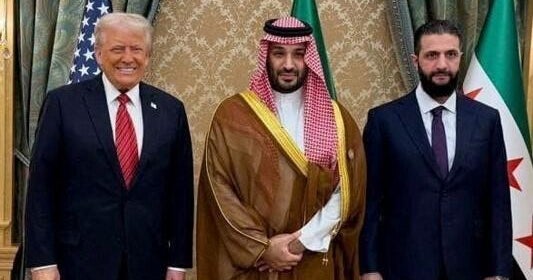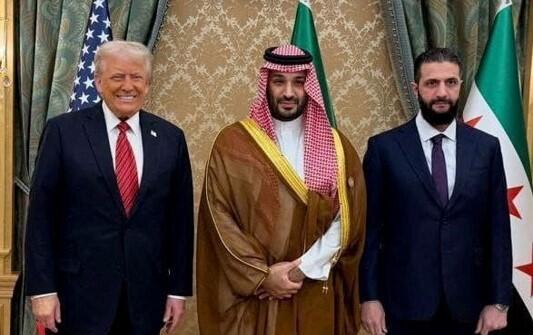President Trump met Wednesday in Saudi Arabia with Syria’s interim president, Ahmad al-Sharaa, highlighting the stunning reversal in fortunes for a former Islamist militant with ties to al Qaeda who spent years with a U.S. government bounty on his head. Al-Sharaa’s rebel forces led the charge on Damascus last year that toppled the decades-long, iron-fisted rule of Syrian dictator Bashar al-Assad, and he has since installed himself as the head of a government presenting itself to the world as inclusive and democratic.
Mr. Trump’s decision to meet with al-Sharaa, after some European leaders have done the same, could be a huge boost to the new Syrian government as it tries to rebuild ties with the Western world. Those relationships have been marked by blistering sanctions and acrimony during and after the Middle Eastern nation’s bloody civil war, which started in 2011.
In a readout on the two leaders’ meeting in Saudi Arabia, White House Press Secretary Karoline Leavitt said Mr. Trump had told the Syrian leader that “he has a tremendous opportunity to do something historic in his country,” and urged him to join Saudi Arabia in signing onto the U.S.-backed Abraham Accords, to normalize ties with Israel.
Saudi Press Agency/Handout/REUTERS
Mr. Trump also told al-Sharaa he should “tell all foreign terrorists to leave Syria; Deport Palestinian terrorists; help the United States to prevent the resurgence of ISIS,” and “assume responsibility for ISIS detention centers in Northeast Syria,” according to Leavitt.
They were joined in their meeting by the host of Mr. Trump’s visit to Saudi Arabia, de facto ruler Crown Prince Mohammed bin Salman, known as MBS, and on the phone by the President of Turkey Recep Tayyip Erdogan.
The meeting came a day after Mr. Trump announced on his visit to the Saudi capital Riyadh that his administration would lift U.S. sanctions on Syria, “to give them a chance at greatness.”
“The sanctions were brutal and crippling, and served … an important function, nevertheless, at the time, but now it’s their [Syrians’] time to shine,” Mr. Trump said in a speech on Tuesday. “I say good luck, Syria. Show us something very special.”
In her readout on Wednesday, Leavitt said “President Erdogan praised President Trump for lifting sanctions on Syria and committed to working alongside Saudi Arabia to encourage peace and prosperity in Syria. The Crown Prince also commended President Trump for his decision to lift the sanctions, calling it courageous.”
She said Al-Sharaa had thanked Mr. Trump, along with MBS and Erdogan, “for their efforts to put together the meeting, and recognized the significant opportunity presented by the Iranians leaving Syria, as well as shared U.S.-Syrian interests in countering terrorism and eliminating chemical weapons.”
The “Iranians” referred to by the White House appeared to be a reference to the ousted Assad regime’s backers in Tehran.
“President Al-Sharaa concluded with his hope that Syria would serve as a critical link in facilitating trade between east and west, and invited American companies to invest in Syrian oil and gas,” Leavitt said.
The White House said Tuesday that Secretary of State Marco Rubio would also meet with the Syrian foreign minister in Turkey later this week.
Mr. Trump became on Wednesday the first U.S. president to meet with a Syrian leader since Bill Clinton met with Assad’s father Hafez al-Assad.
A former insurgent, Sharaa ascended to power last year as Assad’s government rapidly crumbled in the span of several days — bringing an abrupt end to the more than decade-long civil war that devastated Syria.
Sharaa previously led Hayat Tahrir al-Sham, or HTS, an Islamist rebel group that fought the Assad regime and had its roots in the al-Qaeda-allied Nusra Front. Sharaa also participated in the insurgency against U.S. forces in Iraq in the 2000s.
Until last year, the U.S. had a $10 million bounty on Sharaa due to his leadership of HTS, which is designated by the U.S. as a foreign terrorist organization.
Despite the collapse of Assad’s government, many of the intense U.S. sanctions placed on Syria during the last 13 years of Assad’s reign have remained in place. The Trump administration appears to be pushing for normalized relations with the new government in Syria in the hope it can help curb Iranian influence in the country and the wider Middle East, despite Sharaa’s roots in extremism.
Saudi Arabia has also started building a relationship with Sharaa’s government, a move that could also be aimed at limiting the influence of the kingdom’s archrival Iran, which along with Russia, aided Assad in his fight against rebels during the civil war.
Key U.S. ally Israel has been more wary of Sharaa, however, and has continued airstrikes against targets inside Syria — angering Sharaa’s government.
Republican Sen. Lindsey Graham urged caution and said the White House should go through the proper congressional channels in to ease sanctions against Syria. Graham arrived in Turkey on Tuesday to meet with U.S. and Turkish officials about the situation in Syria.
“I am very inclined to support sanctions relief for Syria under the right conditions,” Graham said in a statement. “However, we must remember that the current leadership in Syria achieved its position through force of arms, not through the will of its people. I know the Trump administration has provided guidance to Syrian officials about conditions that need to be met before any sanctions can be relieved.”
Graham said he was “certain that Congress would need to be informed of changes in conditions placed on Syria and how they have met those conditions before Congress can make an informed decision on whether or not it should approve the change in designation.” He also said Israeli officials were “extremely concerned” about the “state of play in Syria.”
“Waiving congressionally passed sanctions is a complicated process,” Graham said. “While I would like to empower the new players in Syria, it has to be done in a coordinated fashion with our allies — especially our friends in Israel — so that numerous security concerns can be addressed.”
Mr. Trump was in Saudi Arabia on Tuesday for the first stop of his four-day trip to the Middle East. It is the first foreign trip of Mr. Trump’s second term. It will include stops in Qatar and the United Arab Emirates later this week.
The president delivered remarks at a U.S.-Saudi investment summit in Riyadh, Saudi Arabia’s capital, as the White House announced a $600 billion investment from Saudi Arabia, including what it touted as the “largest defense sales agreement in history.”


